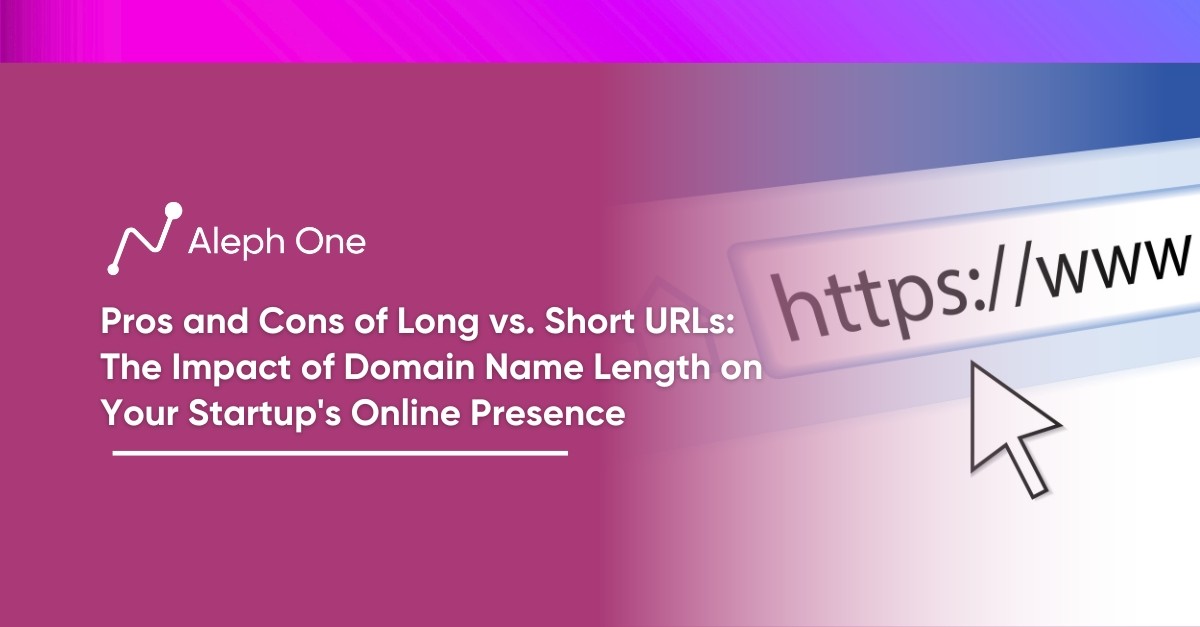Let’s work together to build something amazing. Share your project details and our team will reply to figure out the next steps to your success.

In the digital age, a company’s online presence can make or break its success. One crucial aspect is the domain name, which affects brand visibility, memorability, and search rankings. While shorter domain names are often preferred due to their ease of engagement, longer domain names can have advantages in branding and search engine optimization. This article explores the pros and cons of long versus short URLs and how a company can determine the ideal domain length to suit its needs.

The Truth About Short URLs: Why Our Attention Spans Prefer Them
Our attention spans are shorter than ever in today’s fast-paced digital world. According to recent research, the average human attention span decreased from 12 seconds in 2000 to 8 seconds today. This means we need more patience for long, convoluted domain names when browsing the web.
The Advantages & Disadvantages of Short URLs
Short URLs, typically 3 to 5 characters, capitalize on our need for quick information. Studies show that more temporary domain names are more engaging, memorable, and shareable. When people see a short URL, they are likelier to click through because their curiosity is instantly piqued. Catchy short URLs are also more viral-friendly, as people can quickly read, remember and pass them on to friends.
Short URLs provide a distinct advantage for startups, especially mobile ones. They are ideal for small screens, quick loading times, and sharing on social media. You’ll see higher click-through rates, social shares, and return visits when your URL is fast and easy to engage with. This can significantly impact traffic and brand visibility during the critical early stages of growth.
However, short URLs are only a golden ticket for some new companies. Their popularity and memorability mean the most common short domains like Bit.ly or TinyURL are already taken. Startups may need to get creative with uncommon word combinations or shell out a premium to purchase a fast domain on the secondary market. Some short domains are resold for tens or even hundreds of thousands of dollars, straining the budget of many early-stage startups.
Benefits of Long Domains
While short URLs have benefits, longer domain names should be allowed. A longer, a more unique domain name may be preferable for building a memorable brand, evoking credibility and ranking in search engines. The ideal solution for most startups lies in the middle ground: a domain of 4 to 8 characters that perfectly balances memorability, affordability, and availability. With some creativity, startups can leverage a medium-length domain to their advantage.
Short URLs should be viewed as something other than a necessity or disadvantage for startups. The pros and cons depend entirely on a company’s priorities, budget, and target audience. With research and testing, startups can determine whether a short, long, or medium domain will give them the most significant boost and choose a name their customers will remember.
The Hidden Costs of Short-Domain Gold
Short domain names are highly coveted and scarce, so they often come with a high price tag on the secondary domain market. The shorter and more memorable the domain, the higher the price. According to recent data, the average cost of a four-letter .com domain name is over $2,000. For a three-letter domain, the average price skyrockets to $11,000. But prices for the most desirable domains can go into the millions.
Short Domains and Startup Budgets
Purchasing a short domain can be prohibitive for startups on a tight budget. This significantly impacts a company’s branding and marketing expenses right from the start. While a short domain may provide certain benefits, the high costs to acquire one often outweigh the potential advantages for most new businesses.
The Future of Short Domains
The demand for short domains has steadily increased, driving prices up. Domains that were a few hundred dollars in the 1990s can now sell for hundreds of thousands. Industry experts predict the competition will intensify as more people come online. This will make them easier to obtain with a significant financial investment.
Advantages of Brand Building for Startups
Instead of spending a large portion of their budget on a short domain, startups may be better off choosing a longer, more affordable domain and focusing their resources on building their brand and customer base. The good news is that the specific domain name becomes less important as a company establishes itself. Well-known brands can thrive even without an ultra-short domain. For example, Virgin and Verizon have succeeded despite not having a three-letter .com domain.
While a short, catchy domain may be initially appealing, startups must consider the significant long-term costs. A shorter domain is not a substitute for developing a memorable brand and high-quality product. For most new companies, a medium-length domain of 4 to 8 characters may provide the ideal balance of affordability, availability, and memorability. This allows startups to invest more in the business fundamentals that drive success. With time and brand building, any domain can become a company asset.
How Google’s Algorithm Update Changed the SEO Game
In 2012, Google launched an algorithm update that significantly devalued exact match domains (EMDs) in search rankings. EMDs are domain names that exactly match a keyword or phrase, like Loans.com or PersonalInjuryAttorney.com. Before this update, EMDs held substantial weight in Google’s algorithm and were a popular way for websites to rank highly for their target keywords.
Why Google Diminished Exact Match Domains (EMD)
However, Google’s algorithm update, commonly referred to as “EMD Update,” diminished the search engine benefits of EMDs—the update aimed to reduce the perceived manipulation of search rankings and improve the quality of results. According to Google, EMDs are now just one small signal among many that determine a website’s search position.
The Long-Term Effects of Google’s EMD Update
This update shook up the SEO industry and the perceived value of short, exact-match domains. While an EMD may still provide some benefit, longer and more unique domain names are potentially more valuable for search rankings and brand building. Google’s algorithm considers a memorable domain that incorporates keywords naturally a more robust signal.
Some data suggests EMDs have dropped significantly in search impressions and clicks since 2012. According to a study by Moz, EMDs receive 65% less search traffic on average than before the update. At the same time, domains with keywords in the beginning, middle, or end of the URL have maintained or even improved their search rankings. This indicates the increasing importance of domain names that balance keywords and brand identity.
The impacts of Google’s EMD update are still felt today in the SEO industry. While short domains continue to be highly sought after for their memorability and shareability, longer and more distinctive domain names have clear benefits for search optimization and branding. For startups looking to build an online presence, a domain name with natural-sounding keywords or phrases is a strategic choice that will serve you well in the long run. The EMD Update proved that relying too heavily on exact match domains is a risky SEO strategy, and a balanced, brandable domain is the safer option.
Longer Domains: A Startup’s Competitive Advantage
While short URLs have benefits, longer, more unique domain names can provide a competitive advantage for startups. A memorable domain name incorporating your brand name or critical product features can help establish your identity and stick in customers’ minds. Well-known brands like Spotify, PayPal, and MailChimp have partially built their success through their distinctive domain names.
Spotify’s domain name Spotify.com is a made-up word that has become synonymous with their brand. Spotify is now recognized as one of the leading music streaming services, and their domain name was an integral part of establishing their brand identity. PayPal is another example of a unique brand name and domain that has paid off. PayPal.com has become memorable as one of the first widely-used payment platforms, and its domain name is a vital part of its brand recognition and success.
Why Unique Domains Are Important for Startup Branding
For startups looking to build a memorable brand, a longer, more unique domain name should be an essential consideration. While an unusual name may take time to gain traction, it can help differentiate your company in a crowded market. A unique domain is less likely to run into trademark issues as your company grows. From an SEO perspective, longer, brandable domains are seen as a sign of authority and credibility by Google’s algorithms. Your domain becomes an extension of your brand, and a memorable name closely tied to your company’s identity or product can be a valuable long-term asset.
Best Practice for Branded Domain Names
While lengthy domains were once considered detrimental to SEO and marketing, modern best practices recommend establishing a brandable domain name. A domain name over 10-15 characters may be pushing the limits of memorability for most people. But in general, feel free to choose a domain on the longer side, especially if it incorporates your company or product name. A unique, meaningful domain can help build competitive advantage and brand equity to serve your startup well as you scale. The investment in a longer, brandable domain name often pays off through increased brand recognition, customer loyalty, and search engine optimization.
The Memorable Middle Ground: Why Medium-Length Domains Are Just Right
Domain names that are 4 to 8 characters in length strike the ideal balance of memorability, availability, and affordability for most startups. According to research studies, people can comfortably remember and recite strings of 6-8 letters or numbers, known as the “subitizing range.” Domain names in this range, such as “Google” (6 letters), “Twitter” (7 letters), or “Dropbox” (8 letters), are short enough to remember easily but long enough to be unique and available.
What Does Research Show on Medium-Sized Domain Names?
Data shows that domain names in this medium range of 4 to 8 characters represent a sweet spot for memorability and search volume. A study by domain marketplace Sedo found that domain names with 5 to 7 characters received the highest search traffic, on average. Another study found that 5 to 8-character .com domain names had the highest resale value over time, compared to short (2-4 characters) or longer (9+ characters) domains.
For startups, a domain in this range is typically very affordable to purchase initially compared to ultra-short one or two-character domains that cost tens of thousands of dollars. The startup TaxJar purchased “taxjar.com” for only $3,000 in 2013, now with an estimated resale value of over $200,000. Medium-length domains allow startups to secure a memorable brand identity at a reasonable cost.
Brands with domain names in this range, such as Airbnb, Kickstarter, and Mailchimp, have leveraged them successfully to build memorable brands. Their domains are short enough to type quickly but long enough to be uniquely identifiable. Over time, these medium-length domains have become synonymous with their brands.
For most startups looking to establish a long-term brand presence online, a domain name with 4 to 8 characters is a proven formula for success. With availability, affordability, memorability, and SEO value, medium-length domain Names feel right.
Recommendations: Should You Choose a Long or Short Domain?
Based on the factors we’ve explored, here are my suggestions for startups choosing between a long vs. short domain name:
Mobile First Companies
A short domain under five characters is ideal for mobile-first companies or those relying heavily on social shares. The benefits of memorability and shareability outweigh the costs and challenges in this case. However, only pursue an ultra-short domain if you can get an easy-to-spell option at an affordable price. Otherwise, a medium-length domain may be more pragmatic.
Brand Identity
A longer, unique domain name is worth considering for companies focused on building a memorable brand. Your domain can become integral to your brand identity and story over time. While shorter domains may be trendy, a longer, more specific domain can help you stand out and leave a lasting impression. The SEO benefits of an exact match domain also make more extended options appealing for brand-focused companies.
Finding the Sweet Spot
For most startups, a domain length of 4 to 8 characters provides the best balance of memorability, affordability, and availability. Domains in this range, like “Airbnb” or “Dropbox,” are short enough to remember but long enough to likely find a good available option at a reasonable cost. They provide a memorable brand anchor while still being practical and shareable. This “sweet spot” is a safe choice for most startups.
The Right Budget
In some exceptional cases, an unusually short domain may be worth investing in if you have the budget and it perfectly matches your brand. For example, the domain “ai” could be ideal for an artificial intelligence company. However, costs would likely be very high, so only pursue this option if you have funding and plan to build a company to match the domain’s prestige.
The most critical factors are your brand vision, marketing focus, startup budget, and target audience. Consider how your domain choice will impact your brand building, social sharing, SEO, and memorability. Find an option in the sweet spot of practicality and distinctiveness for your unique company. With the right domain, your online presence and brand identity can thrive.
Final Thoughts
The domain name is a critical aspect of a startup’s online presence, and choosing the right length of the URL is crucial. Short URLs are more memorable and engaging, but they come at a high cost, which can strain the budget of most early-stage startups. On the other hand, longer domain names can be more unique and memorable and provide a distinct advantage in branding and SEO. The ideal solution for most startups lies in the middle ground: a domain of 4 to 8 characters that perfectly balances memorability, affordability, and availability. Startups must focus on building a memorable brand and high-quality product, which can become a company asset. Which domain length is right for your startup?
Get the latest news and updates from Aleph One in your inbox.



